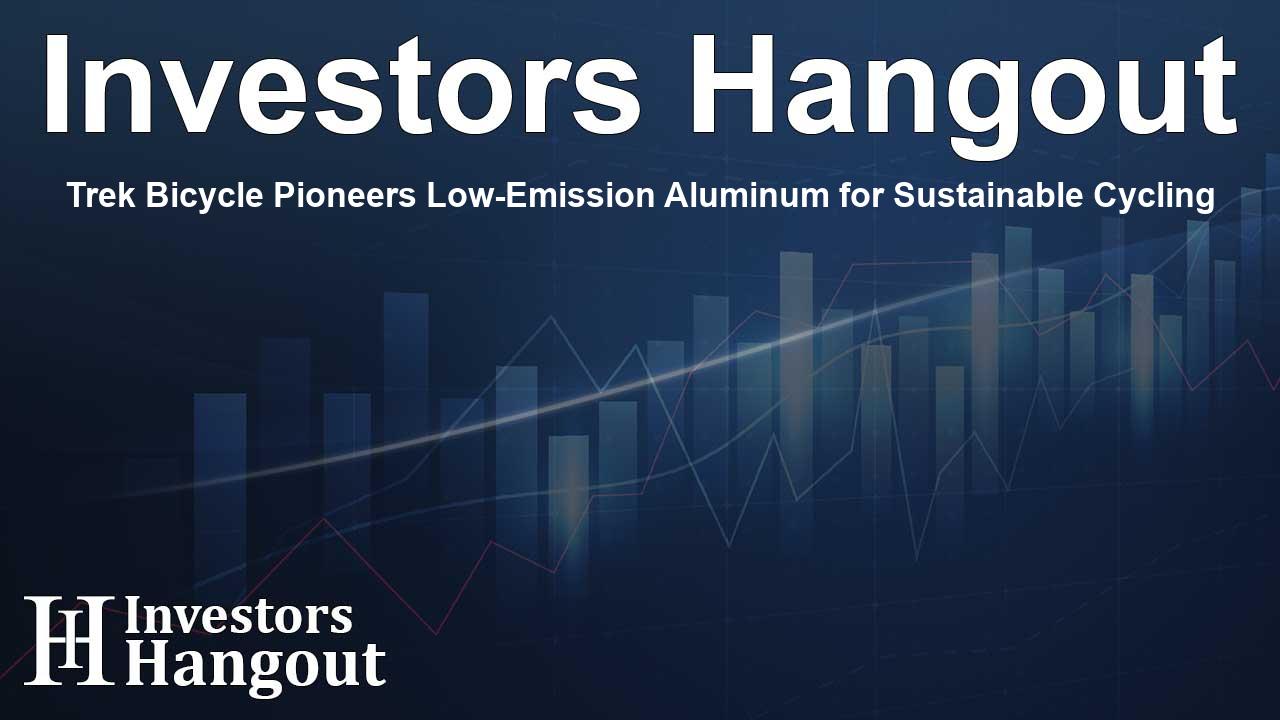Trek Bicycle Pioneers Low-Emission Aluminum for Sustainable Cycling

Trek Bicycle: Leading the Charge in Sustainable Manufacturing
In a landmark initiative, Trek Bicycle has announced a groundbreaking shift towards low-emission aluminum, setting a new benchmark in the cycling industry. Starting from a significant rollout in 2025, Trek will ensure that nearly every aluminum bicycle frame produced by the company, including those from its Electra and Diamant brands, will be made from aluminum sourced from facilities powered by renewable energy and incorporating recycled materials.
A Major Step in Carbon Footprint Reduction
This pivotal change is expected to influence the production of over 1 million bicycles each year, marking it as the largest carbon-reduction initiative in Trek's history. This ambitious move aims to exceed the company’s SBTi-certified climate targets, showcasing an essential step towards sustainability.
Background on Trek's Shift to Sustainable Aluminum
Trek began exploring the use of lower-impact aluminum back in 2021, and since then, it has established a comprehensive aluminum sourcing policy that compels suppliers to adapt to these new standards. The first frames using low-emission aluminum were successfully produced in 2024, and by 2025, this eco-friendly aluminum will be standard across Trek's offerings.
High Standards for Sustainability
All aluminum frames produced will maintain Trek's rigorous specifications and performance standards, with the added benefit of a significantly lower carbon footprint. Trek's President, John Burke, mentioned, 'This is a major move, not just for Trek, but for what's possible in bicycle manufacturing.' He expressed hope that this initiative inspires other companies to pursue sustainable practices.
New Emission Standards for Aluminum Sourcing
Trek's sustainable aluminum sourcing policy limits emissions to 11 kg CO?e per kg or less, which aligns with the standards set by the Aluminum Stewardship Initiative. This forward-thinking initiative is a result of collaboration with primary material producers who utilize renewable electricity in their operations.
Expanding Sustainability Beyond Frames
While the initial focus has been on frame tubing, Trek's commitment to sustainability extends to other aluminum components, including rims, seatposts, handlebars, and stems. Joel DeMeritt, Trek's Global Sustainability Manager, emphasized the long-term vision: 'Our aim is to apply this thinking across every major aluminum part we make.'
Sharing Best Practices for Wider Industry Adoption
Trek is committed to enabling change beyond its own operations. The company plans to make its sustainable aluminum sourcing strategy accessible to other brands, enhancing collective efforts towards sustainability. They recognize the importance of industry collaboration in tackling climate change and are eager to provide guidance.
Five Tips for Embracing Low-Emission Aluminum
- Set Clear Goals — and Make Sure Everyone Knows Them: Establishing clear long-term sustainability goals ensures that every team member understands the company’s commitment to environmental responsibility. This alignment facilitates effective action.
- Know Your Materials: It is vital to assess the origins and production processes of the aluminum used. Trek's sustainable sourcing policy categorizes suppliers to help shift towards cleaner material options.
- Ask for Better: Sometimes, improving sustainability can be achieved by raising expectations with current suppliers. Simple requests can result in significant progress.
- Understand Recycling: With aluminum recycling being an established practice, Trek encourages businesses to leverage these existing processes while carefully assessing new recycled materials for their environmental impact.
- Tell Your Story: Transparency in sustainability efforts fosters trust among customers and industry partners. Sharing successes and challenges promotes wider industry participation in change.
Trek Bicycle’s commitment to reducing its environmental impact and achieving substantial climate goals presents a compelling blueprint for sustainable practices in the cycling industry. Progress updates are outlined in the company's most recent Sustainability Report, emphasizing their continued journey towards a greener future.
Frequently Asked Questions
What is Trek's new sustainability initiative?
Trek's new initiative focuses on sourcing low-emission aluminum for its bicycle frames, underscoring a commitment to reducing carbon footprint in manufacturing.
When is Trek planning to implement this change?
The shift to low-emission aluminum will begin rolling out in 2025, with preparations already underway.
How does Trek ensure the quality of low-emission aluminum frames?
Frames made with low-emission aluminum will still meet all previous specifications and performance standards, ensuring no compromise on quality.
Can other companies adopt Trek's sourcing policy?
Yes, Trek is sharing its sustainable aluminum sourcing policy with other brands in the industry to promote widespread adoption of these practices.
What are the long-term goals for Trek regarding sustainability?
Trek aims to integrate sustainability across all components in its bicycles, continuously improving and expanding its low-emission practices.
About The Author
Contact Hannah Lewis privately here. Or send an email with ATTN: Hannah Lewis as the subject to contact@investorshangout.com.
About Investors Hangout
Investors Hangout is a leading online stock forum for financial discussion and learning, offering a wide range of free tools and resources. It draws in traders of all levels, who exchange market knowledge, investigate trading tactics, and keep an eye on industry developments in real time. Featuring financial articles, stock message boards, quotes, charts, company profiles, and live news updates. Through cooperative learning and a wealth of informational resources, it helps users from novices creating their first portfolios to experts honing their techniques. Join Investors Hangout today: https://investorshangout.com/
The content of this article is based on factual, publicly available information and does not represent legal, financial, or investment advice. Investors Hangout does not offer financial advice, and the author is not a licensed financial advisor. Consult a qualified advisor before making any financial or investment decisions based on this article. This article should not be considered advice to purchase, sell, or hold any securities or other investments. If any of the material provided here is inaccurate, please contact us for corrections.
